2021学年六年级下册译林版英语一般将来时复习课件(45张PPT)
文档属性
| 名称 | 2021学年六年级下册译林版英语一般将来时复习课件(45张PPT) | 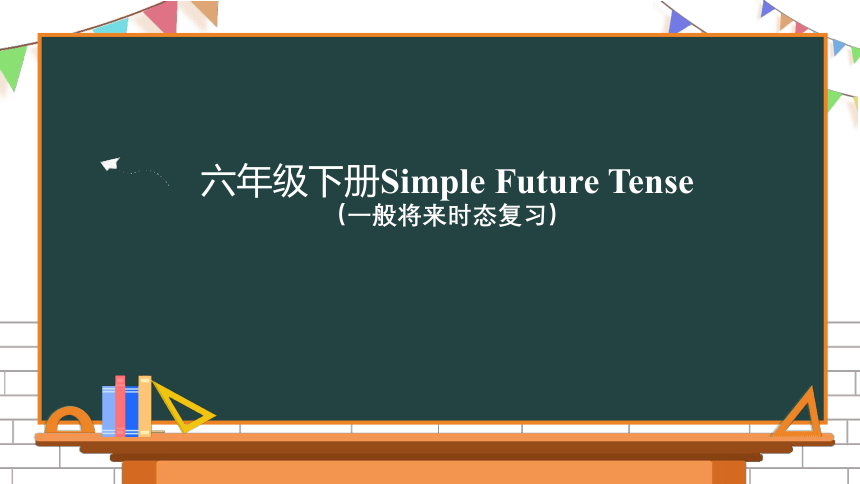 | |
| 格式 | pptx | ||
| 文件大小 | 5.0MB | ||
| 资源类型 | 教案 | ||
| 版本资源 | 牛津译林版 | ||
| 科目 | 英语 | ||
| 更新时间 | 2021-06-01 20:09:18 | ||
图片预览

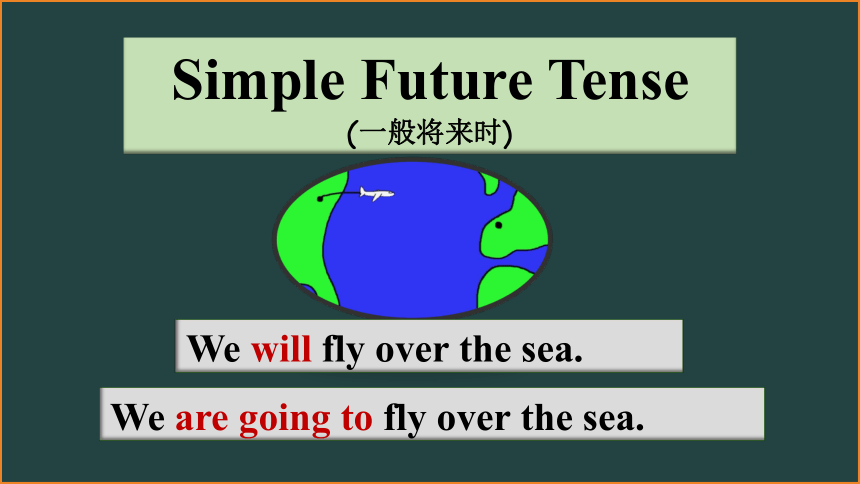
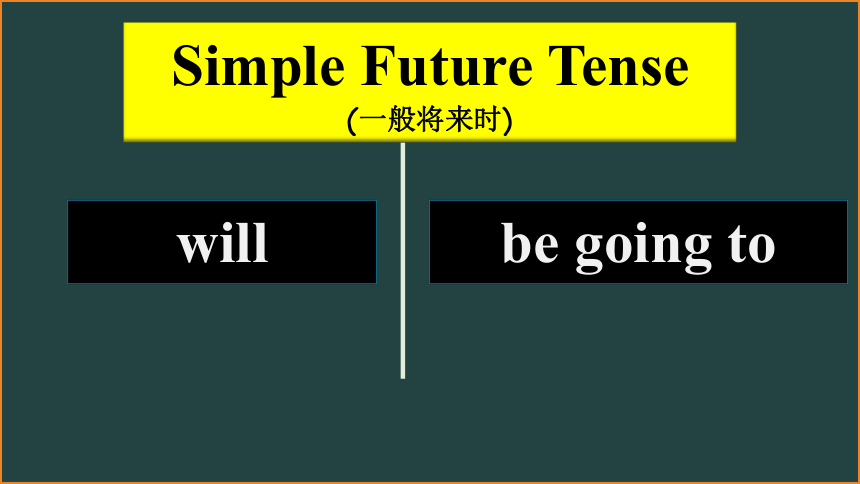
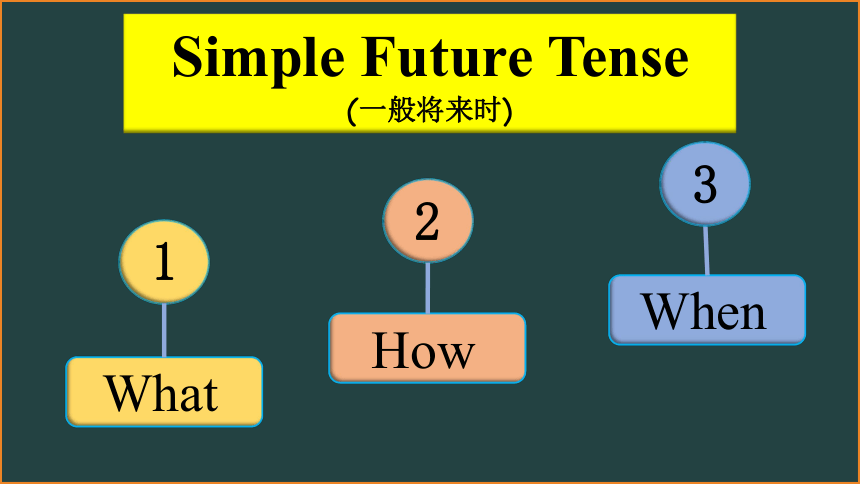
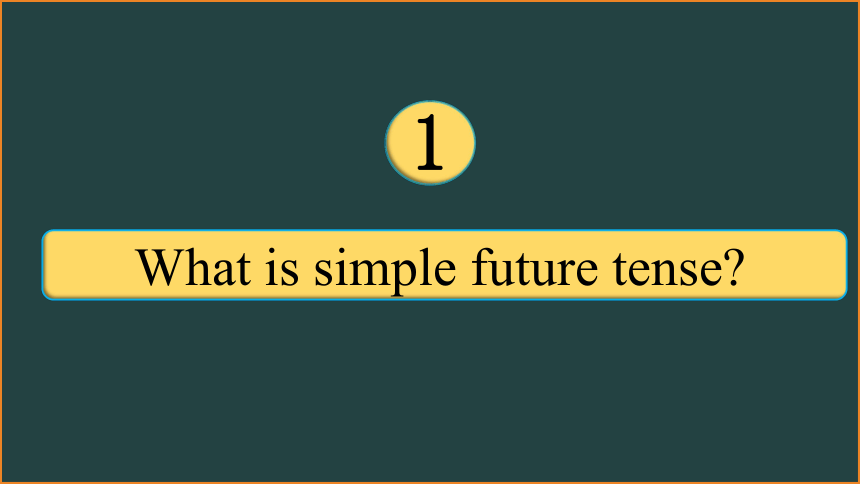
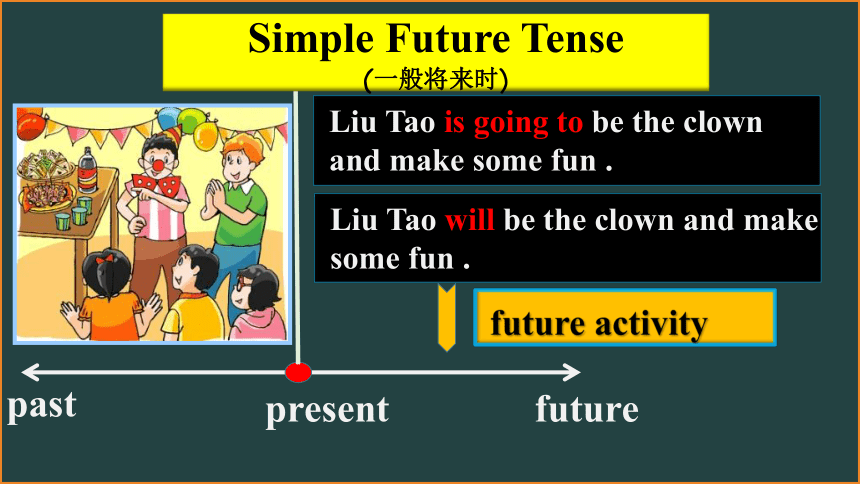
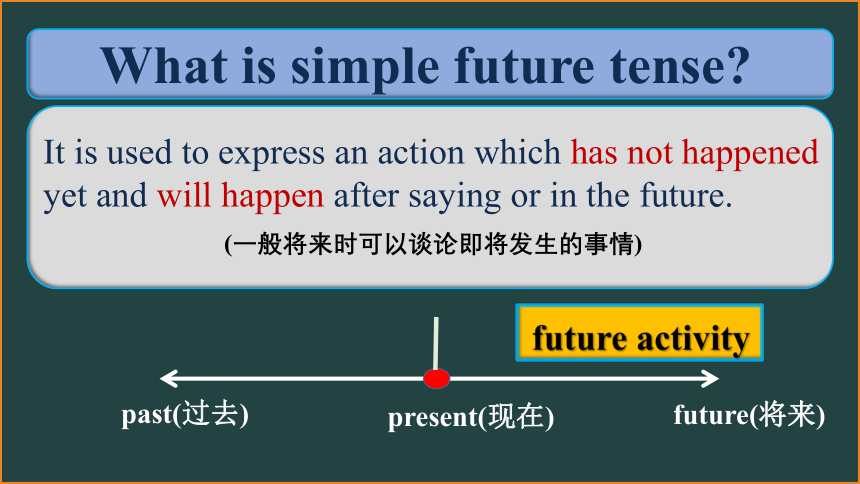
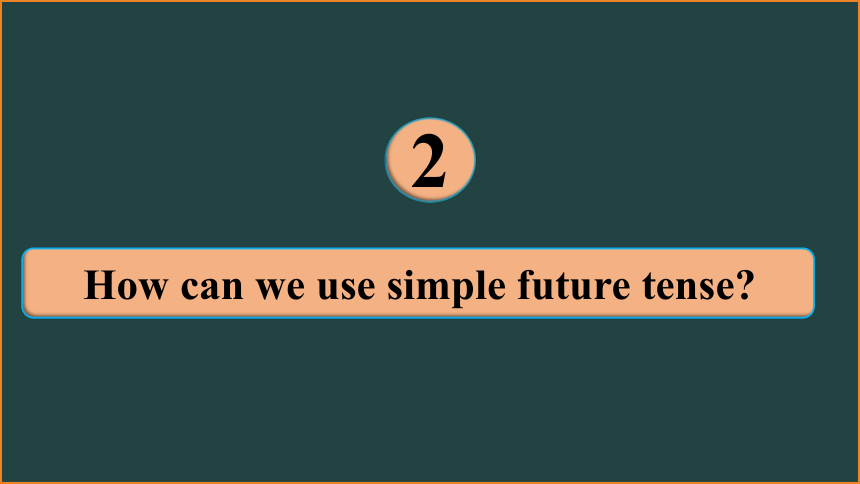
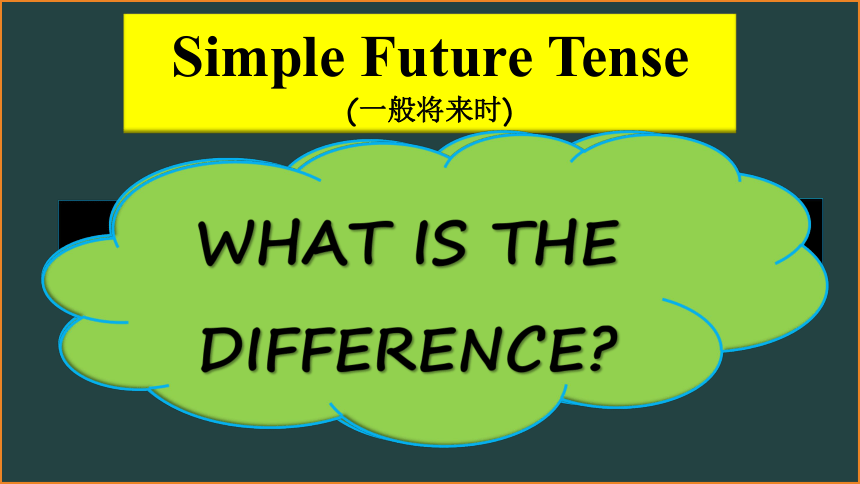
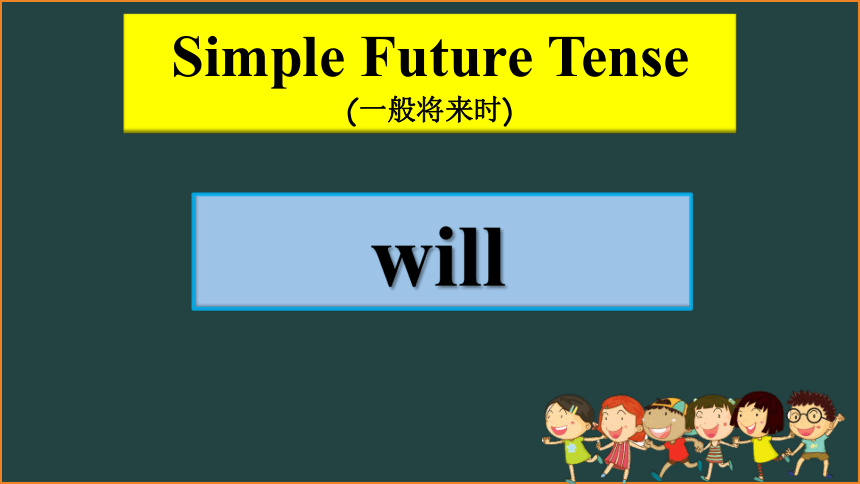
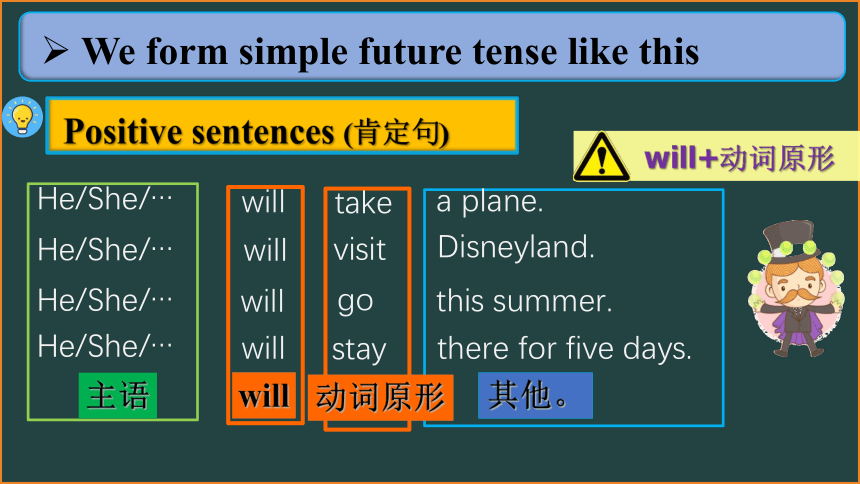
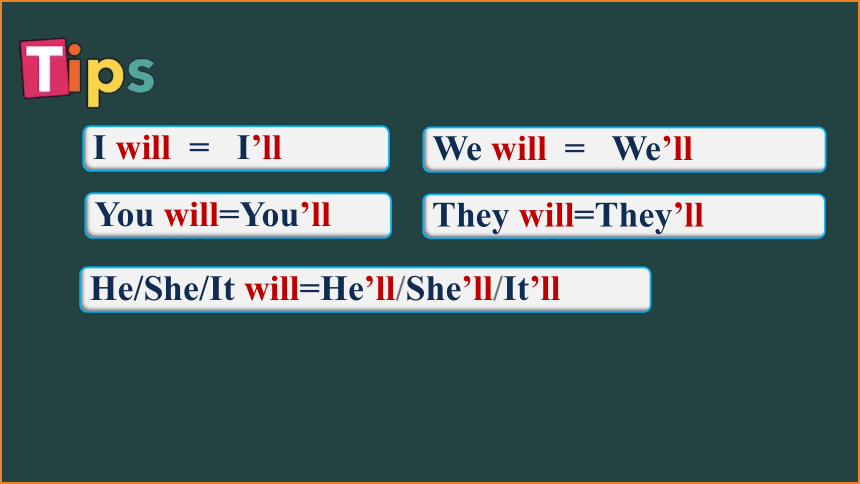
文档简介
六年级下册Simple
Future
Tense
(一般将来时态复习)
Simple
Future
Tense
(一般将来时)
We
will
fly
over
the
sea.
We
are
going
to
fly
over
the
sea.
will
be
going
to
Simple
Future
Tense
(一般将来时)
1
What
2
How
When
3
Simple
Future
Tense
(一般将来时)
What
is
simple
future
tense?
1
Think
and
answer
Liu
Tao
is
going
to
be
the
clown
and
make
some
fun
.
Liu
Tao
will
be
the
clown
and
make
some
fun
.
past
future
present
future
activity
Simple
Future
Tense
(一般将来时)
What
is
simple
future
tense?
It
is
used
to
express
an
action
which
has
not
happened
yet
and
will
happen
after
saying
or
in
the
future.
(一般将来时可以谈论即将发生的事情)
past(过去)
future(将来)
present(现在)
future
activity
2
How
can
we
use
simple
future
tense?
Simple
Future
Tense
(一般将来时)
will
be
going
to
Can
I
use
them
whenever
I
want?
WHAT
IS
THE
DIFFERENCE?
will
Simple
Future
Tense
(一般将来时)
We
form
simple
future
tense
like
this
will
will
will
will
He/She/…
He/She/…
He/She/…
He/She/…
take
visit
go
stay
a
plane.
Disneyland.
this
summer.
there
for
five
days.
主语
will
动词原形
其他。
will+动词原形
Positive
sentences
(肯定句)
I
will
=
I’ll
We
will
=
We’ll
You
will=You’ll
They
will=They’ll
He/She/It
will=He’ll/She’ll/It’ll
Negative
sentences
(否定句)
I/We
will
visit
Disneyland.
He/She/It
will
go
there
by
plane.
not
not
主语+
will
+
not
+
V
(base
form)
will
not
=
won’t
Will
Will
Will
he
she
they
a
plane?
Peking
duck?
there
for
three
days?
take
eat
stay
Will
主语
动词原形
回答:
肯定:
Yes,
主语+
will.
否定:No,
主语+
will
not/won't.
Yes,
...
will.
No,
...
won't/will
not.
其它?
Ask
and
answer
questions
(疑问句)
1.
Jack
_______
(be)
12
years
old
next
year
.
2.
We
_______________(not
have)
lessons
tomorrow.
3.
It
__________(rain)
this
afternoon.
4.
The
park
_________
(open)
in
Shanghai
in
two
years.
will
be
won’t
have
will
rain
will
open
Have
a
try
!
5.
A:
What
will
you
do
this
evening?
B:
I
___________________
this
evening.
will
do
my
homework
Have
a
try
他们明天将去参观公园。
They
will
visit
the
park
tomorrow.
否定句
They
will
not
visit
the
park
tomorrow.
一般疑问句
Will
they
visit
the
park
tomorrow?
否定回答
No,
they
won’t.
summer
holiday
plan
Where
How
long
When
What
How
place
traffic
date
days/weeks
activities
活动
Review
the
plans
________’s
plan
list
Miss
Sun
{16D9F66E-5EB9-4882-86FB-DCBF35E3C3E4}Place:
Date:
Day(s):
Traffic:
Activities:
Make
a
plan
list
{16D9F66E-5EB9-4882-86FB-DCBF35E3C3E4}?
Where
will
you
go?
?
Will
you
go
to...?
{16D9F66E-5EB9-4882-86FB-DCBF35E3C3E4}?
How
long
will
you
stay?
?
Will
you
stay
there
for...
day(s)/week(s)/month(s)?
{16D9F66E-5EB9-4882-86FB-DCBF35E3C3E4}?
How
will
you
go
there?
?
Will
you
take
a...?
{16D9F66E-5EB9-4882-86FB-DCBF35E3C3E4}?
What
will
you
do?
?
Will
you...?
{16D9F66E-5EB9-4882-86FB-DCBF35E3C3E4}?
When
will
you
go
there?
?
Will
you
go
there
on...?
{16D9F66E-5EB9-4882-86FB-DCBF35E3C3E4}Place:
Date:
Day(s):
Traffic:
Activities:
{16D9F66E-5EB9-4882-86FB-DCBF35E3C3E4}?
Where
will
you
go?
?
Will
you
go
to...?
{16D9F66E-5EB9-4882-86FB-DCBF35E3C3E4}?
When
will
you
go
there?
?
Will
you
go
there
on...?
{16D9F66E-5EB9-4882-86FB-DCBF35E3C3E4}?
How
will
you
go
there?
?
Will
you
take
a...?
{16D9F66E-5EB9-4882-86FB-DCBF35E3C3E4}?
What
will
you
do?
?
Will
you...?
Chengdu
on
20th
July
five
days
take
a
plane
visit
Chengdu
Panda
Base
try
Sichuan
Hotpot
(基地)
(火锅)
{16D9F66E-5EB9-4882-86FB-DCBF35E3C3E4}?
How
long
will
you
stay?
?
Will
you
stay
there
for...
day(s)/week(s)/month(s)?
Make
a
plan
list
________’s
plan
list
Miss
Sun
be
going
to
Simple
Future
Tense
(一般将来时)
Let’s
think.
Children’s
Day
Party
注意:be动词要根据主语而变化!
主语
be
going
to
动词原形
其它.
Positive
sentences
(肯定句)
The
children
are
going
to
have
a
party
on
Children’s
Day.
They
are
going
to
have
the
party
at
Mike’s
house.
The
party
is
going
to
begin
on
Sunday
morning
.
Wang
Bing
is
going
to
bring
some
fruit.
They
are
going
to
have
some
fun.
Wang
Bing
is
going
to
bring
some
fruit.
They
are
going
to
have
the
party
at
Mike’s
house.
They
are
going
to
have
some
fun
first.
The
children
are
going
to
have
a
party
on
Children’s
Day.
The
party
is
going
to
begin
on
Sunday
morning
.
What
are
the
children
going
to
do
on
Children’s
Day?
Where
are
they
going
to
have
the
party?
When
is
the
party
going
to
begin?
What
is
WangBing
going
to
bring?
What
are
they
going
to
do
first?
Can
you
ask
questions
about
them?
Wh-
questions
(特殊疑问句)
When
Where
What
What
are
are
are
is
they
they
they
Liu
Tao
going
to
have
a
party?
bring
to
the
party?
do
at
the
party
?
going
to
going
to
going
to
have
a
party?
特殊疑问词
be
主语
going
to
动词原形
其它?
Wh-
questions
(特殊疑问句)
Is
Is
Are
he
she
they
wash
the
plates?
clean
the
table?
watch
TV?
going
to
going
to
going
to
Be
主语
going
to
动词原形
回答:
肯定:
Yes,
主语+
be.
否定:No,
主语+
be
+
not.
Yes,
he
is./
No,
he
isn’t..
Yes,
she
is./
No,
she
isn’t.
Yes,
they
are./
No,
they
aren’t.
其它?
Ask
and
answer
questions
(疑问句)
收件人:
发件人:
主题:
David@
My
Children’s
Day
party
Mike
@
Hello,David,
I
was
so
excited
to
have
a
Children’s
Day
party
with
my
friends.
How
about
your
Children’s
Day?
Yours
Mike
Review
the
plans
Dear
David
It
is
_______________
this
Sunday,
My
friends
and
I__________________________________
.
They___________________________________.
First,
we________________________________.
Next
,
we________________________________.
_____Yang
ling
___________________?
No,_______.
She
is
going
to
cook
vegetables.
_____Su
Hai
and
Su
Yang_______________________?
Yes,_______.
What
a
happy
Children's
Day!
Dear
David
It
is
_______________
this
Sunday,
My
friends
and
I__________________________________
.
They___________________________________.
First,
we________________________________.
Next
,
we________________________________.
_____Yang
ling
___________________?
No,
_______.
She
is
going
to
cook
vegetables.
_____
Su
Hai
and
Su
Yang_______________________?
Yes,_______.
What
a
happy
Children's
Day!
Children's
Day
are
going
to
have
a
party
at
Mike's
house
are
going
to
bring
some
snacks,drinks
and
balloons
are
going
to
have
some
fun
are
going
to
cook
food
for
dinner
Is
going
to
cook
fish
she
isn't
going
to
make
a
salad
Are
they
are
be
going
to
VS
will
相同点:1.
都用于一般将来时,表达还未发生的事。
2.
be
going
to和will后面都用动词原形。
不同点:1.
be
going
to
一般表示已经安排好会发生的活
动,比如一个聚会、一场比赛。
2.
will一般侧重于说话人的意愿,表达一种愿望。
Have
a
try
1.
–Annie
is
in
hospital.
-Oh,
really?
I
___________
(go)
and
visit
her.
2.
The
sky
is
really
dark.
______
it
__________________
(snow)
tonight?
3.
–Lisa,
it’s
late.
We
should
go
now
.
-
I
_____________
(come).
will
go
Is
going
to
snow
am
coming
go,
come,
leave,
start,
arrive,
stay,
fly,
etc
可用现在进行时表示安排和计划或即将发生的动作。
be
+
V-ing
(现在进行时表将来时)
Pay
attention
to
these!
We’re
leaving
for
Qingdao
tomorrow.
They
will
go/
are
going_(go)to
Shanghai
next
month.
我们明天动身去青岛。
Pay
attention
to
these!
There
be的将来时:
There
will
be
…
(2)There
is/are
going
to
be
…
____
__
_____
___
___
a
party
at
the
school
hall
tomorrow
afternoon.
在操场上明天将进行一场比赛。
明天下午计划在学校礼堂进行一个聚会。
There
is
going
to
be
There
will____
a
match
on
the
playground
tomorrow.
be
There
will
have…
There
be
going
to
have…
3
When
can
we
use
simple
future
tense?
Time
Time
expressions
for
future
(一般将来时的时间状语)
in
the
future
in
two
days…
next
week/
month
…
this
Sunday/
afternoon
…
the
coming
weekend
…
tomorrow
(morning/afternoon…),
the
day
after
tomorrow
soon,
tonight,
how
soon
Summary
1
future
action
2
will,
be
going
to
time
expressions
3
Simple
Future
Tense
(一般将来时)
Finish
the
following
exercises.
Review
the
simple
future
tense.
Homework
(课程设计说明)
六年级下册Simple
Future
Tense
(一般将来时态复习)
大家好,下面我就对本节课的设计做一个简单地说明。我执教的内容是六年级总复习阶段时态专题复习课,复习内容是一般将来时以及表示将来意义的表达。
本节课我以“plans”这个话题进行一般将来时的复习,围绕着“什么是一般将来时?”“怎样使用一般将来时?”及“何时使用一般将来时?”这三个问题,带领学生结合旧知系统复习并梳理。在复习中有意识、有步骤地把机械性操练和交际性操练结合起来,引导学生把所学知识运用到生活中去。复习活动及复习内容由易到难、阶梯式递进,做到精讲多练,适当点拨,反复练习,直到熟练掌握。
教学背景分析:
在小学阶段中,“一般将来时”是重点时态知识。在小学阶段,一般将来时的教学内容主要集中在六年级上册第八单元及六年级下册第五、六、七单元。通过本课的复习,结合书本旧知,让学生在体验、实践、参与、合作与交流的过程中进一步明晰“一般将来时”所表达的意义和句型结构特点。
三、教学目标设定:
知识技能目标:
掌握一般将来时的用法并加以灵活运用:
(1)能用will和be
going
to
表达将来;
(2)能正确使用一般将来时的各种形式,掌握肯定句、否定句、疑问句及其肯定和否定回答的基本用法;
(3)能用正确的表达方式谈论将来的计划与打算。
情感目标
(l)学会与同学交流合作,学会合理制定各类计划。
(2)激发说英语的欲望。
教学过程:
在本课的教学过程中,我努力体现
“意义领先”,
把语言结构形式跟它所要表达的实际意义结合起来讲,把结构和规则的学习与意义表达结合起来,解释语法现象的时候首先从意义出发,结合当时当地的语境来理解意义,结合语言使用来解释结构形式。
首先通过视频导入simple
future
tense
这一话题,引入一般将来时态的两种表达,并将本课针对这一时态的复习分为三个板块进行解读,让学生从概念、运用到时间状语三方面清晰架构对于时态的理解。
在What
is
the
simple
future
tense
这一环节,
我通过学生所熟悉的例句,让学生能自我体会并理解一般将来时态这一概念定义。
接下来在运用环节,我则通过
will
和be
going
to
这两种不同的形态,分别展开复习。
“先例后法”,先向学生逐步渗透具体的语言现象,然后让学生观察分析并找出规律,归纳和总结出语法规则,这样就能使语法知识更容易被学生接受、理解和掌握。
通过学生所熟悉的例句呈现,引导学生归纳will引导的一般将来时态的正确表达及否定句、一般疑问句等的变化。并结合所给词的适当形式填空及句型转化及时加以巩固操练。以谈论老师的暑假计划为例,引导学生用will
引导的问句来准确提问,学会交流与表达。
而对“be
going
to
”结构的复习,我结合学生熟悉的“party”主题,通过对第五单元party
的复习,对将来时态“be
going
to
”结构的总结,让学生在这能更深一层地熟悉和掌握将来时态的结构。并创设任务,帮助Mike完成电子邮件这一任务,让学生在不知不觉中复习所学的知识,培养学生综合运用语言的能力,体现了语言的实用性,让学生体验到学习的成就感。
而对于学生容易混淆或犯错的相关语法点,如现在进行时表示将来时以及there
be
的将来时,我则通过具体的语例,引导学生对其进行观察,对比和分析,找出关键点并加以突破,使学生最终理解和掌握这些语法知识。然后再附相关的练习题,加以巩固。我觉得在语法教学或复习中,教师无论采用哪种教学方法,都要注意“精讲多练,以练为主,点到为止,注重运用”,让学生在练中有悟,在练中获得听、说、读、写等的语言运用能力。
以上是我对这节课的一些想法,
有不当之处,敬请指正。
Future
Tense
(一般将来时态复习)
Simple
Future
Tense
(一般将来时)
We
will
fly
over
the
sea.
We
are
going
to
fly
over
the
sea.
will
be
going
to
Simple
Future
Tense
(一般将来时)
1
What
2
How
When
3
Simple
Future
Tense
(一般将来时)
What
is
simple
future
tense?
1
Think
and
answer
Liu
Tao
is
going
to
be
the
clown
and
make
some
fun
.
Liu
Tao
will
be
the
clown
and
make
some
fun
.
past
future
present
future
activity
Simple
Future
Tense
(一般将来时)
What
is
simple
future
tense?
It
is
used
to
express
an
action
which
has
not
happened
yet
and
will
happen
after
saying
or
in
the
future.
(一般将来时可以谈论即将发生的事情)
past(过去)
future(将来)
present(现在)
future
activity
2
How
can
we
use
simple
future
tense?
Simple
Future
Tense
(一般将来时)
will
be
going
to
Can
I
use
them
whenever
I
want?
WHAT
IS
THE
DIFFERENCE?
will
Simple
Future
Tense
(一般将来时)
We
form
simple
future
tense
like
this
will
will
will
will
He/She/…
He/She/…
He/She/…
He/She/…
take
visit
go
stay
a
plane.
Disneyland.
this
summer.
there
for
five
days.
主语
will
动词原形
其他。
will+动词原形
Positive
sentences
(肯定句)
I
will
=
I’ll
We
will
=
We’ll
You
will=You’ll
They
will=They’ll
He/She/It
will=He’ll/She’ll/It’ll
Negative
sentences
(否定句)
I/We
will
visit
Disneyland.
He/She/It
will
go
there
by
plane.
not
not
主语+
will
+
not
+
V
(base
form)
will
not
=
won’t
Will
Will
Will
he
she
they
a
plane?
Peking
duck?
there
for
three
days?
take
eat
stay
Will
主语
动词原形
回答:
肯定:
Yes,
主语+
will.
否定:No,
主语+
will
not/won't.
Yes,
...
will.
No,
...
won't/will
not.
其它?
Ask
and
answer
questions
(疑问句)
1.
Jack
_______
(be)
12
years
old
next
year
.
2.
We
_______________(not
have)
lessons
tomorrow.
3.
It
__________(rain)
this
afternoon.
4.
The
park
_________
(open)
in
Shanghai
in
two
years.
will
be
won’t
have
will
rain
will
open
Have
a
try
!
5.
A:
What
will
you
do
this
evening?
B:
I
___________________
this
evening.
will
do
my
homework
Have
a
try
他们明天将去参观公园。
They
will
visit
the
park
tomorrow.
否定句
They
will
not
visit
the
park
tomorrow.
一般疑问句
Will
they
visit
the
park
tomorrow?
否定回答
No,
they
won’t.
summer
holiday
plan
Where
How
long
When
What
How
place
traffic
date
days/weeks
activities
活动
Review
the
plans
________’s
plan
list
Miss
Sun
{16D9F66E-5EB9-4882-86FB-DCBF35E3C3E4}Place:
Date:
Day(s):
Traffic:
Activities:
Make
a
plan
list
{16D9F66E-5EB9-4882-86FB-DCBF35E3C3E4}?
Where
will
you
go?
?
Will
you
go
to...?
{16D9F66E-5EB9-4882-86FB-DCBF35E3C3E4}?
How
long
will
you
stay?
?
Will
you
stay
there
for...
day(s)/week(s)/month(s)?
{16D9F66E-5EB9-4882-86FB-DCBF35E3C3E4}?
How
will
you
go
there?
?
Will
you
take
a...?
{16D9F66E-5EB9-4882-86FB-DCBF35E3C3E4}?
What
will
you
do?
?
Will
you...?
{16D9F66E-5EB9-4882-86FB-DCBF35E3C3E4}?
When
will
you
go
there?
?
Will
you
go
there
on...?
{16D9F66E-5EB9-4882-86FB-DCBF35E3C3E4}Place:
Date:
Day(s):
Traffic:
Activities:
{16D9F66E-5EB9-4882-86FB-DCBF35E3C3E4}?
Where
will
you
go?
?
Will
you
go
to...?
{16D9F66E-5EB9-4882-86FB-DCBF35E3C3E4}?
When
will
you
go
there?
?
Will
you
go
there
on...?
{16D9F66E-5EB9-4882-86FB-DCBF35E3C3E4}?
How
will
you
go
there?
?
Will
you
take
a...?
{16D9F66E-5EB9-4882-86FB-DCBF35E3C3E4}?
What
will
you
do?
?
Will
you...?
Chengdu
on
20th
July
five
days
take
a
plane
visit
Chengdu
Panda
Base
try
Sichuan
Hotpot
(基地)
(火锅)
{16D9F66E-5EB9-4882-86FB-DCBF35E3C3E4}?
How
long
will
you
stay?
?
Will
you
stay
there
for...
day(s)/week(s)/month(s)?
Make
a
plan
list
________’s
plan
list
Miss
Sun
be
going
to
Simple
Future
Tense
(一般将来时)
Let’s
think.
Children’s
Day
Party
注意:be动词要根据主语而变化!
主语
be
going
to
动词原形
其它.
Positive
sentences
(肯定句)
The
children
are
going
to
have
a
party
on
Children’s
Day.
They
are
going
to
have
the
party
at
Mike’s
house.
The
party
is
going
to
begin
on
Sunday
morning
.
Wang
Bing
is
going
to
bring
some
fruit.
They
are
going
to
have
some
fun.
Wang
Bing
is
going
to
bring
some
fruit.
They
are
going
to
have
the
party
at
Mike’s
house.
They
are
going
to
have
some
fun
first.
The
children
are
going
to
have
a
party
on
Children’s
Day.
The
party
is
going
to
begin
on
Sunday
morning
.
What
are
the
children
going
to
do
on
Children’s
Day?
Where
are
they
going
to
have
the
party?
When
is
the
party
going
to
begin?
What
is
WangBing
going
to
bring?
What
are
they
going
to
do
first?
Can
you
ask
questions
about
them?
Wh-
questions
(特殊疑问句)
When
Where
What
What
are
are
are
is
they
they
they
Liu
Tao
going
to
have
a
party?
bring
to
the
party?
do
at
the
party
?
going
to
going
to
going
to
have
a
party?
特殊疑问词
be
主语
going
to
动词原形
其它?
Wh-
questions
(特殊疑问句)
Is
Is
Are
he
she
they
wash
the
plates?
clean
the
table?
watch
TV?
going
to
going
to
going
to
Be
主语
going
to
动词原形
回答:
肯定:
Yes,
主语+
be.
否定:No,
主语+
be
+
not.
Yes,
he
is./
No,
he
isn’t..
Yes,
she
is./
No,
she
isn’t.
Yes,
they
are./
No,
they
aren’t.
其它?
Ask
and
answer
questions
(疑问句)
收件人:
发件人:
主题:
David@
My
Children’s
Day
party
Mike
@
Hello,David,
I
was
so
excited
to
have
a
Children’s
Day
party
with
my
friends.
How
about
your
Children’s
Day?
Yours
Mike
Review
the
plans
Dear
David
It
is
_______________
this
Sunday,
My
friends
and
I__________________________________
.
They___________________________________.
First,
we________________________________.
Next
,
we________________________________.
_____Yang
ling
___________________?
No,_______.
She
is
going
to
cook
vegetables.
_____Su
Hai
and
Su
Yang_______________________?
Yes,_______.
What
a
happy
Children's
Day!
Dear
David
It
is
_______________
this
Sunday,
My
friends
and
I__________________________________
.
They___________________________________.
First,
we________________________________.
Next
,
we________________________________.
_____Yang
ling
___________________?
No,
_______.
She
is
going
to
cook
vegetables.
_____
Su
Hai
and
Su
Yang_______________________?
Yes,_______.
What
a
happy
Children's
Day!
Children's
Day
are
going
to
have
a
party
at
Mike's
house
are
going
to
bring
some
snacks,drinks
and
balloons
are
going
to
have
some
fun
are
going
to
cook
food
for
dinner
Is
going
to
cook
fish
she
isn't
going
to
make
a
salad
Are
they
are
be
going
to
VS
will
相同点:1.
都用于一般将来时,表达还未发生的事。
2.
be
going
to和will后面都用动词原形。
不同点:1.
be
going
to
一般表示已经安排好会发生的活
动,比如一个聚会、一场比赛。
2.
will一般侧重于说话人的意愿,表达一种愿望。
Have
a
try
1.
–Annie
is
in
hospital.
-Oh,
really?
I
___________
(go)
and
visit
her.
2.
The
sky
is
really
dark.
______
it
__________________
(snow)
tonight?
3.
–Lisa,
it’s
late.
We
should
go
now
.
-
I
_____________
(come).
will
go
Is
going
to
snow
am
coming
go,
come,
leave,
start,
arrive,
stay,
fly,
etc
可用现在进行时表示安排和计划或即将发生的动作。
be
+
V-ing
(现在进行时表将来时)
Pay
attention
to
these!
We’re
leaving
for
Qingdao
tomorrow.
They
will
go/
are
going_(go)to
Shanghai
next
month.
我们明天动身去青岛。
Pay
attention
to
these!
There
be的将来时:
There
will
be
…
(2)There
is/are
going
to
be
…
____
__
_____
___
___
a
party
at
the
school
hall
tomorrow
afternoon.
在操场上明天将进行一场比赛。
明天下午计划在学校礼堂进行一个聚会。
There
is
going
to
be
There
will____
a
match
on
the
playground
tomorrow.
be
There
will
have…
There
be
going
to
have…
3
When
can
we
use
simple
future
tense?
Time
Time
expressions
for
future
(一般将来时的时间状语)
in
the
future
in
two
days…
next
week/
month
…
this
Sunday/
afternoon
…
the
coming
weekend
…
tomorrow
(morning/afternoon…),
the
day
after
tomorrow
soon,
tonight,
how
soon
Summary
1
future
action
2
will,
be
going
to
time
expressions
3
Simple
Future
Tense
(一般将来时)
Finish
the
following
exercises.
Review
the
simple
future
tense.
Homework
(课程设计说明)
六年级下册Simple
Future
Tense
(一般将来时态复习)
大家好,下面我就对本节课的设计做一个简单地说明。我执教的内容是六年级总复习阶段时态专题复习课,复习内容是一般将来时以及表示将来意义的表达。
本节课我以“plans”这个话题进行一般将来时的复习,围绕着“什么是一般将来时?”“怎样使用一般将来时?”及“何时使用一般将来时?”这三个问题,带领学生结合旧知系统复习并梳理。在复习中有意识、有步骤地把机械性操练和交际性操练结合起来,引导学生把所学知识运用到生活中去。复习活动及复习内容由易到难、阶梯式递进,做到精讲多练,适当点拨,反复练习,直到熟练掌握。
教学背景分析:
在小学阶段中,“一般将来时”是重点时态知识。在小学阶段,一般将来时的教学内容主要集中在六年级上册第八单元及六年级下册第五、六、七单元。通过本课的复习,结合书本旧知,让学生在体验、实践、参与、合作与交流的过程中进一步明晰“一般将来时”所表达的意义和句型结构特点。
三、教学目标设定:
知识技能目标:
掌握一般将来时的用法并加以灵活运用:
(1)能用will和be
going
to
表达将来;
(2)能正确使用一般将来时的各种形式,掌握肯定句、否定句、疑问句及其肯定和否定回答的基本用法;
(3)能用正确的表达方式谈论将来的计划与打算。
情感目标
(l)学会与同学交流合作,学会合理制定各类计划。
(2)激发说英语的欲望。
教学过程:
在本课的教学过程中,我努力体现
“意义领先”,
把语言结构形式跟它所要表达的实际意义结合起来讲,把结构和规则的学习与意义表达结合起来,解释语法现象的时候首先从意义出发,结合当时当地的语境来理解意义,结合语言使用来解释结构形式。
首先通过视频导入simple
future
tense
这一话题,引入一般将来时态的两种表达,并将本课针对这一时态的复习分为三个板块进行解读,让学生从概念、运用到时间状语三方面清晰架构对于时态的理解。
在What
is
the
simple
future
tense
这一环节,
我通过学生所熟悉的例句,让学生能自我体会并理解一般将来时态这一概念定义。
接下来在运用环节,我则通过
will
和be
going
to
这两种不同的形态,分别展开复习。
“先例后法”,先向学生逐步渗透具体的语言现象,然后让学生观察分析并找出规律,归纳和总结出语法规则,这样就能使语法知识更容易被学生接受、理解和掌握。
通过学生所熟悉的例句呈现,引导学生归纳will引导的一般将来时态的正确表达及否定句、一般疑问句等的变化。并结合所给词的适当形式填空及句型转化及时加以巩固操练。以谈论老师的暑假计划为例,引导学生用will
引导的问句来准确提问,学会交流与表达。
而对“be
going
to
”结构的复习,我结合学生熟悉的“party”主题,通过对第五单元party
的复习,对将来时态“be
going
to
”结构的总结,让学生在这能更深一层地熟悉和掌握将来时态的结构。并创设任务,帮助Mike完成电子邮件这一任务,让学生在不知不觉中复习所学的知识,培养学生综合运用语言的能力,体现了语言的实用性,让学生体验到学习的成就感。
而对于学生容易混淆或犯错的相关语法点,如现在进行时表示将来时以及there
be
的将来时,我则通过具体的语例,引导学生对其进行观察,对比和分析,找出关键点并加以突破,使学生最终理解和掌握这些语法知识。然后再附相关的练习题,加以巩固。我觉得在语法教学或复习中,教师无论采用哪种教学方法,都要注意“精讲多练,以练为主,点到为止,注重运用”,让学生在练中有悟,在练中获得听、说、读、写等的语言运用能力。
以上是我对这节课的一些想法,
有不当之处,敬请指正。
同课章节目录
